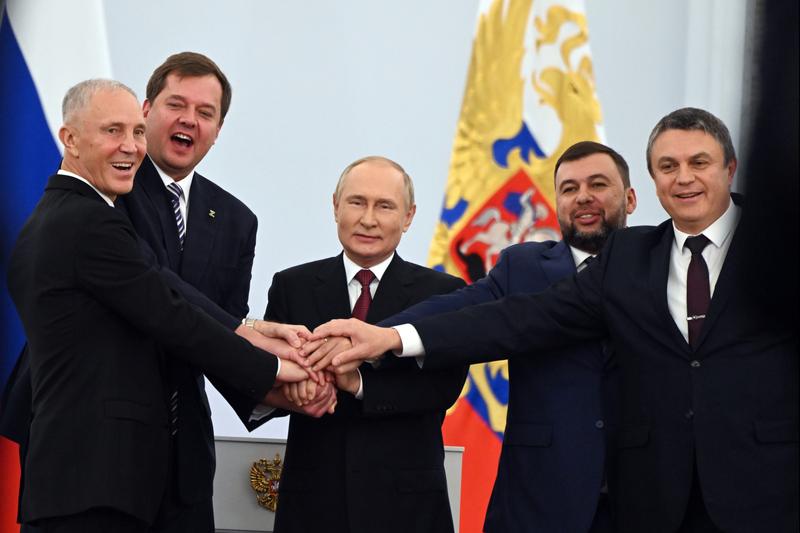 From left, Moscow-appointed head of Kherson Region Vladimir Saldo, Moscow-appointed head of Zaporizhzhia region Yevgeny Balitsky, Russian President Vladimir Putin, center, Denis Pushilin, leader of self-proclaimed of the Donetsk People's Republic and Leonid Pasechnik, leader of self-proclaimed Luhansk People's Republic, pose for a photo during a ceremony to sign the treaties for the four regions to join Russia, at the Kremlin in Moscow, on Sept 30, 2022. (GRIGORY SYSOYEV, SPUTNIK, KREMLIN POOL PHOTO VIA AP, FILE)
From left, Moscow-appointed head of Kherson Region Vladimir Saldo, Moscow-appointed head of Zaporizhzhia region Yevgeny Balitsky, Russian President Vladimir Putin, center, Denis Pushilin, leader of self-proclaimed of the Donetsk People's Republic and Leonid Pasechnik, leader of self-proclaimed Luhansk People's Republic, pose for a photo during a ceremony to sign the treaties for the four regions to join Russia, at the Kremlin in Moscow, on Sept 30, 2022. (GRIGORY SYSOYEV, SPUTNIK, KREMLIN POOL PHOTO VIA AP, FILE)
MOSCOW/KYIV/PRAGUE/TEHRAN – Russian President Vladimir Putin on Wednesday signed federal laws formalizing the accession of Donetsk, Lugansk, Zaporizhzhia and Kherson.
Putin also signed federal constitutional laws on forming new regions within Russia.
The relevant documents have been published on the country's official legal information portal.
Russia's upper house of parliament, the Federation Council, and the lower house of parliament, the State Duma, ratified accession treaties earlier this week.
READ MORE: UNSC rejects resolution that condemns Ukraine referendums
On Friday, the Kremlin held a treaty signing ceremony to incorporate Donetsk, Lugansk, Zaporizhzhia and Kherson into the Russian Federation.
Zelensky rules out negotiation
Ukrainian President Volodymyr Zelensky signed a decree to put into effect the decision of the National Security and Defense Council (NSDC), which rules out holding any negotiations with President Putin, Zelensky's press service reported on Tuesday.
The document, published on the president’s website, said Ukraine's NSDC deemed holding talks with Putin "impossible."
At an informal EU summit at Prague later this week, EU leaders are set to discuss “restrictive measures to further increase pressure on Russia”
With his decree, Zelensky also instructed the government to prepare proposals for the creation of a multi-level security guarantee system designed to boost Ukraine's defense potential.
On Sept 30, the NSDC adopted a decision aimed at guaranteeing Ukraine's security and restoring its territorial integrity following Moscow's formal recognition of four Ukrainian regions, which are partially controlled by Russia, as Russian territory.
Ukrainian and Russian negotiators held the latest round of face-to-face peace talks in Istanbul, Türkiye, on March 29.
EU leaders to discuss Ukraine
Prague, the capital of the Czech Republic that currently holds the rotating Presidency of the Council of the European Union (EU), will host an informal EU summit later this week.
On Friday, the leaders of the EU member states are set to discuss the Russia-Ukraine conflict, the rising costs of energy and its economic ramifications.
In his invitation letter to EU member states for the Prague summit, European Council President Charles Michel said the leaders will discuss ways to continue providing "strong economic, military, political and financial support" to Ukraine, while strengthening "our restrictive measures to further increase pressure on Russia”.
The European Commission last week proposed the eighth round of sanctions against Russia. The proposed sanctions package will further restrict trade to "isolate and hit Russia's economy even more," and includes additional export bans on key technologies used for the military.
The EU countries are reportedly getting close to agreeing on the package, which is expected to be approved this week.
ALSO READ: Europe should not sleepwalk into another world war
Last week, the EU member states' energy ministers reached a political agreement on a series of emergency measures, including reducing electricity use and capping the revenues of electricity producers, in a bid to mitigate the current high energy prices. However, the member states remain divided on capping natural gas prices.
EU leaders will also examine ways to protect their countries' critical infrastructure. Several leaks have been detected recently on the Nord Stream 1 and 2 gas pipelines in the Baltic Sea near Denmark and Sweden, an incident reportedly being investigated as probable sabotage.
Iran denies drones claim
Iran’s foreign ministry on Tuesday denied that the country had delivered drones to Russia for use in the Ukraine conflict.
"The Islamic Republic of Iran considers news published on the delivery of (Iran's) drones to Russia for use in the Ukraine conflict as baseless and does not confirm it," ministry spokesman Nasser Kanaani was quoted as saying in a post on the foreign ministry website.
"Since the beginning of the (Ukraine) conflict, we have always announced our principled and clear policy on active impartiality and opposition to war, underlining the necessity of a political resolution to disputes between the two sides, and away from violence," he said.
Besides, Iran has always reiterated the need for resolving the differences in a peaceful manner through dialogue, added Kanaani.


